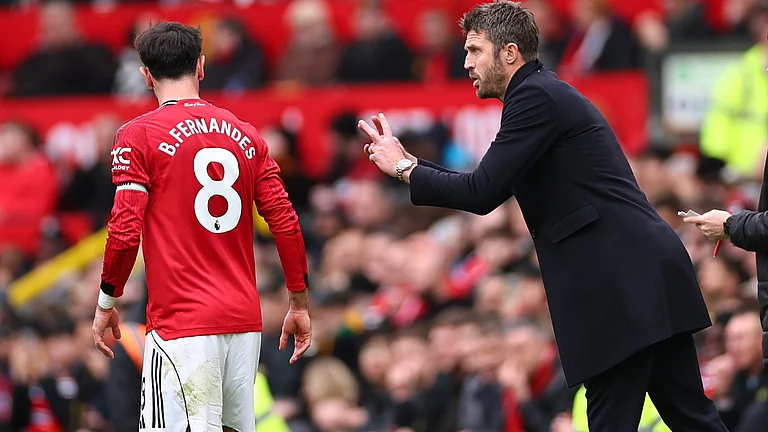Now that the semifinals are done and dusted in the three Hindi heartland states, the focus has shifted to the grand alliance of opposition parties, and to Uttar Pradesh—a key state deciding the finals, the general elections, by dint of its 80 seats in the Lok Sabha, the maximum for any state. Failing to forge a pre-poll alliance with the Congress, the Mayawati-led BSP bagged only 10 seats in the three states—Rajasthan, Madhya Pradesh and Chhattisgarh. Had the pact materialised, most analyses suggest a probable gain of 10-15 seats to the alliance.
While the BSP continues to be useful to the anti-Modi opposition with its core voters comprising nearly 18 per cent of the UP electorate, Mayawati seems to be hedging her bets about joining the grand alliance. One sign that she would leverage her utility in UP to drive a hard bargain elsewhere was her skipping the swearing-in of the three new CMs, right after she had reluctantly warmed up to the Congress by offering support to form the government in Madhya Pradesh and Rajasthan.
“Who gave the Congress the authority to call meetings of opposition leaders? It should be the collective effort of the parties, not initiated by one party alone,” says BSP spokesperson Sudhindra Bhadoria. “The Congress has shown they don’t want us…. Let them come to the table with fair demands, we are ready to negotiate.”
The BSP, however, should be worried about its declining voteshare among its core constituency outside UP. In Chhattisgarh, where it added a seat this time to its previous tally of one, the voteshare slumped from 4.27 in 2013 to 3.4 per cent. And in Madhya Pradesh, it came down from 6.32 to 5 per cent, while its seats came down from four in 2013 to two. It fared better in Rajasthan, going from three to six seats, with voteshare rising marginally from 3.48 to 4 per cent.
Observers attribute the dipping fortunes in the three states to lack of a strong party network on the ground in these states, to which Ajoy Bose, author of Behenji: Rise and Fall of Mayawati, adds the lack of good leaders in these states. “Mayawati made some unrealistic demands for seats. Congress called her bluff and went ahead to win. Allying with the Congress would have benefited her,” says Bose.
Admitting that Mayawati remains the “tallest leader of the Dalit movement”, Prof Badri Narayan Tiwari of Allahabad’s G.B. Pant Social Science Institute, sounds a note of caution: “She couldn’t capitalise the Dalit anger on various issues and lead the movement, leaving that space to the Congress. She also erred by allying with Ajit Jogi in Chhattisgarh.”
In Uttar Pradesh, where she has been out of power for the past 10 years, Mayawati would be looking to resurrect her electoral fortunes decimated in the 2014 general elections and the 2017 assembly polls. It’s unlikely to be a smooth ride with a resurgent Congress in a powerful bargaining position, while she also draws strength from the backing of the Samajwadi Party. “And in western UP, Ajit Singh (Rashtriya Lok Dal) adds to her strength,” adds Bose. “The Congress would be conciliatory towards Mayawati because her brand value as the foremost Dalit leader is more than the BSP’s strength on the ground.”
Spokesperson Badoria reiterates that if the Congress wants seats in UP, it must ask Mayawati. “We have shown the way in Gorakhpur. That’s our success story,” he says. Dalit scholar Kancha Ilaiah says the moment is right for a Dalit woman to become PM for the first time. “The BJP has destroyed the moral ground of electoral politics, and only Mayawati has the clout and pan-India presence to finish the BJP,” says Ilaiah.
Political observers feel caste will play a prominent role in the gathering momentum against the BJP. “Last time, Modi was able to mobilise people’s aspirational identities, and Dalits moved out of caste and voted for him,” says Surinder Jodhka, a sociologist at JNU, Delhi. “As their livelihood suffered huge setbacks as a result of demonetisation and GST, they would want to go back to Mayawati. The BJP will be in trouble even if 5 per cent turn away.”
While the BSP will be wooing back its core Jatav voters, who deserted Mayawati in the last elections, the Congress hopes elite-caste ire against the BJP over buckling to Dalit pressure for restoration of the original provisions of the atrocities act would work in its favour. “A sizeable share of Muslims too will vote for the Congress as they feel it can form a government at the Centre,” adds Tiwari.
In the backdrop, Dalit politics is witnessing a churning with Ambedkarite movements led by students and other youngsters beginning to make their presence felt in many parts of the country. “Our primary aim is to defeat the BJP, and for that I am ready to work with the BSP and any other party,” says Dalit leader and Gujarat MLA Jignesh Mevani. Jodhka says, “Dalits are looking for a new vision, and that’s where Dalit leaders like Jignesh Mevani come in.”
***
- Mayawati skipped the swearing-in of the three CMs right after offering post-poll support to Congress in two
- The BSP should be worried about declining voteshare among its core constituency outside Uttar Pradesh.


























